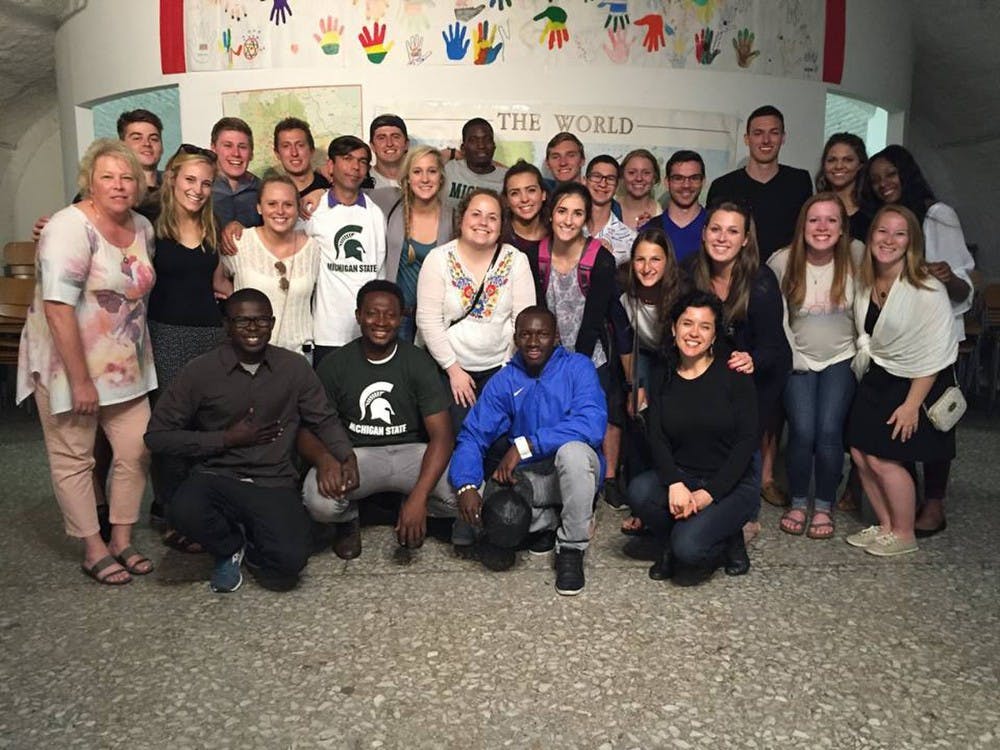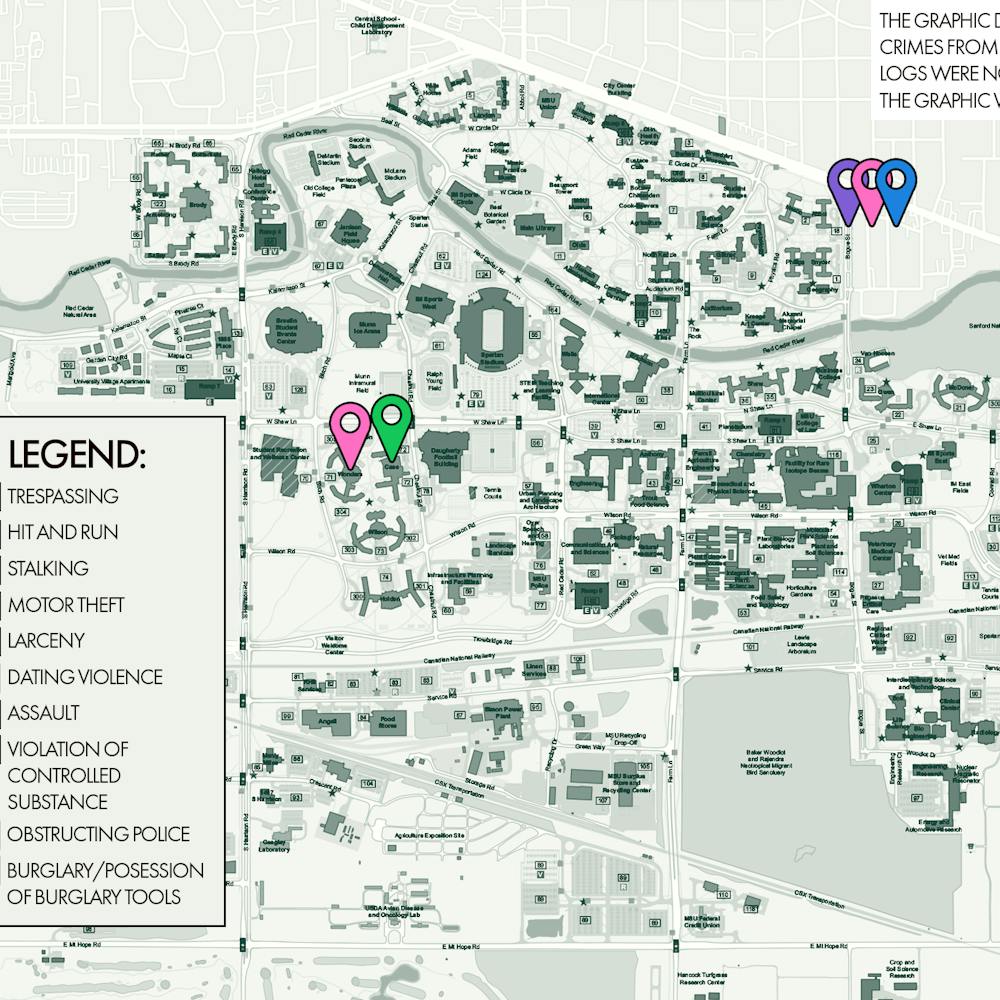“Oftentimes these people arrive and their families have been murdered, so they arrive without family,” she said. “They arrive without friends, they arrive without a job. They arrive without money, they arrive without a place to stay.”
This past summer, Rumler and 18 MSU students left the U.S. for Italy. There they spent time both in the classroom and at the Joel Nafuma Refugee Center. In the classroom, students learned about marketing, communication and sales. At the center, they learned about so much more, Rumler said.
“They (the students) were completely oblivious to the global refugee crisis,” Rumler said. “But throughout the six weeks that we were in Rome, the more we discussed and learned about the refugee crisis, the more they went from ignorance actually to advocacy.”
It was this same want for advocacy that drove Rumler to create the non-profit organization Welcome the Strangers. According to its website, the organization supports “the development of political refugees from all around the globe.”
There was one refugee that stood out from the rest. Rakeen, who changed his name for protection purposes, has been a refugee for almost eight years. Back in his home country of Afghanistan, he was kidnapped by a mafia-type group who asked for $500,000 for his return, Rumler said. During the four months he was held captive, Rakeen was regularly beaten and filmed. The video tapes were sent to his family to encourage them to send the ransom money.
He eventually escaped when his captors forgot to tie him back up after using the bathroom one day. After squeezing out a window and falling two stories, Rakeen begged a taxi driver to take him to a police station. His troubles were not over, though. In retaliation for his escape, the kidnappers killed almost his entire family, Rumler said. She also said his story is not unique, and many refugees face similar horrors.
According to the Refugee Development Center website, between 400 and 700 refugees are resettled in Lansing every year. The amount of refugees in mid-Michigan is between 10,000 and 13,000, according to the website.
Although there are many refugees so close by, Rumler said generally students are unaware of the plight of refugees until they go on a trip like the Made in Italy study abroad.
“I would say that the typical MSU student knows nothing about that,” she said. “When the students finally learned about what was happening, and not only learned about the phenomena but then also met the people that were affected by it and became friends with them, developed a relationship with them, that changed them from being pretty unaware to wanting to advocate for the behalf of these people.”
When students on the Made in Italy study abroad arrive at their destination, one of the first things they experience is “a day in the life of a refugee” tour. On this tour, five refugees take the students around the city to show them where they get basic services. These places included: where they have to register with the police, where they first arrive at the train station, where they have to go if they want to get meals or shower and where they would sleep, Rumler said.
“They showed us the parks they slept in, the benches that they slept on, the fields that overlooked the Coliseum,” she said. “It was a beautiful field with wildflowers and poppies and grasses, but you could see the indentation of where the cardboard had been laid out flat for them to sleep on.”
During the tour, which lasts from 8 a.m. to 1 p.m., students walk up to 15 miles, Rumler said.
Seeing how the refugees lived sparked a passion to help others, communication senior Katherine Harvey said. Harvey said Rumler approached her about the Made in Italy study abroad program and she was roped in right away. Rumler said she wanted to do something bigger, something greater.
This led Harvey and other students to start Spartans Welcome the Strangers.
“We decided to make this group and this organization because it touched us that deeply,” kinesiology senior and president of the group Kyle Gomes said. “We just want to bring back what we learned and how we felt and hopefully touch some people the way we were touched.”
Gomes said Spartans Welcome the Strangers mainly works to raise awareness and educate the local community as well as the MSU student body about what they learned about the refugee crisis that’s happening internationally.
“We had a lot of information kind of shoved in our face and we got pushed off a cliff to learn about it,” Gomes said. “Spartans Welcome the Strangers is our way to give back, in a way.”
As of now, the group is mostly working on getting their name out there, Gomes said. He said in a couple years he would love for the group to have a table at Sparticipation and have people not only know what it is already, but also be excited to sign up.
Support student media!
Please consider donating to The State News and help fund the future of journalism.
Communication junior Kaila Baroff said that another big goal of the group is to educate and bring awareness of the misconceptions of refugees.
“Mostly for us, the term ‘refugee’ has a really big misconception,” she said. “People think very negatively about them just because they’re not educated. Before we went to Rome we all had zero clue what they were. It sounds so cliche, but it was a life changing experience where, again, it was uncomfortable, you were forced to hear stories that were really painful to hear about and that you didn’t want to know about in your own little world. But it’s really opened all of us up to to being more understanding, not just with refugees but also in our daily lives with every situation that we have to handle.”
Baroff and Gomes agreed people often jump to conclusions on topics they are not educated on. Even if an idea is a wrong one, it can spread like an infectious disease, Gomes said. That’s why it’s important to keep an open mind about refugees, Baroff said.
“How can you say a refugee is lazy and doesn’t do anything, they’re dirty, they’re whatever, when you don’t really know what they experience or what they go through? And again that’s what we had, that eye-opening experience,” Baroff said. “With this organization we hope to actually educate and spread that awareness so that these negative connotations don’t take over and become a mindset, because they’re extremely inaccurate.”
Besides advocacy, the group also hopes to raise funds for refugees, Gomes said. The organization is planning to have a car wash at some point at a 7-Eleven along with other fundraising events.
The organization is also working on a book titled, “Walking in Rakeen’s Shoes,” to acknowledge the struggles that Rakeen and other refugees have faced.
“We’re writing a book to raise awareness to separate an individual human being from the clump that we often think of when we think of refugees, and you see a boat full of people on some rickety raft that’s been adrift at sea for 10 days or more,” she said. “Because it’s so many people I think we tend to dehumanize what’s happening to these people. By telling Rakeen’s story we’re hoping to give a voice and an individual perspective of what each and every one of these people goes through.”
Along with Rakeen’s voice, student voices will be presented in the book, Rumler said. Although there is a difference in perspective, there is some common ground the students can share with refugees, like what it’s like to be a stranger in a strange land and how badly people can miss family and friends, Rumler said.
The students who went on the trip agreed that Rakeen was one of the kindest and most appreciative people they had ever met. On the last day of the trip, he made the group a Thanksgiving-like dinner with Afghani food. His one condition for the group was they could not be sad that night. Instead, they all needed to be happy and enjoy each other’s company. Afterward, the tables were pushed aside and a dance party commenced, Harvey said.
“I don’t think I’ve ever been so happy and sweaty and carefree in my life, and I think everyone who went on the trip is extremely close,” she said. “We hang out all the time because we get it and we love talking about it, and it’s not something that we can leave Rome and say, ‘That was a great experience, now what’s next for me?’ in the sense of once something like that happens to your heart, you have to keep going and you can’t un-know it.”
Discussion
Share and discuss “How the story of a refugee changed the lives of 18 MSU students ” on social media.







